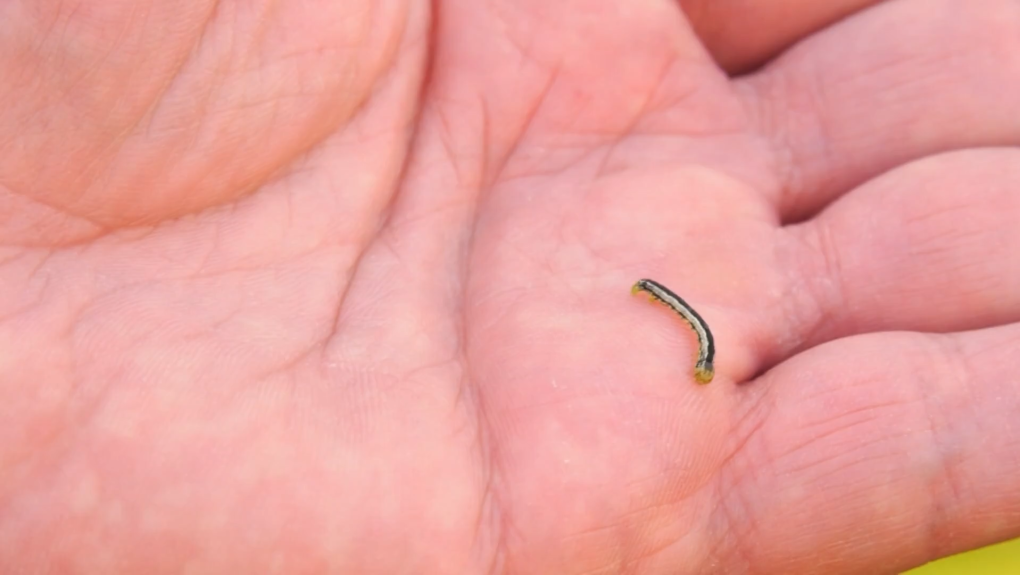
Ian Campbell
CTVNews
NorthernOntario.ca
Videojournalist
Published Nov. 6, 2021
Published Nov. 6, 2021
SUDBURY -
The summer 'scourge' of the tent caterpillar that Sudbury has endured these last few summers may actually have been working to help the environment.
That's the findings of a new paper from the University of Cambridge where PhD student Sam Woodman found they're actually helping to improve water quality of nearby lakes.
"What we found was sort of after an insect outbreak of typically caterpillars who are feeding on leaves, traditionally you'd think of the effects of it mostly being on the trees themselves, eating the leaves and that's harming the trees in someway but in reality they have effects beyond that," Woodman told CTV News.
Woodman, who’s originally from Lethbridge, collaborated with Laurentian University's Living with Lakes Centre to study the effects of caterpillars in the region.
"After they eat the leaves that has to be excreted out at some point, pooped out as it were, and that feces is released into the environment and it has its own effects," he explained.
They found it's been working to help improve water quality of nearby lakes on a huge scale. The researcher admits it came as a surprise to see the large increase in nitrogen and decrease in carbon.
According to their findings, the excrement washes into lake water and acts s fertilizer for microbes, which they releases carbon dioxide into the atmosphere as they metabolize.
The excrement, or frass as it's called, is said to be highly dissolvable so after a heavy rain, it's washed into nearby waterways.
"I was surprised by the magnitude of it, this was the idea I had when I applied for my PhD, and I had this thought that disturbance events can have a massive effect on the landscape but they're not limited to the landscape that they occur in and how can we look at those effects beyond the force they occur in," he said.
But Woodman says it's also a delicate balancing act when it comes to the caterpillars from an ecological point of view. Too much of a good thing could lead to impacts in other ways.
"Knowing about the effects will allow us to manage for it better, so if an entire forest was eaten by caterpillars that might clean up the water clarity that year but then you might get a ton of algae growing and that might promote some harmful algae at some point,” said Woodman.
“And the opposite case, if you got rid of all these caterpillars, well we might be losing some bumps in nitrogen that might be occurring and losing out in the lakes' health over all so it's not necessarily about it being good or bad, it's about keeping it in balance."
The study also warned of northwards range expansion any increased inspection population growth as a result of climate changes. It's putting northern forests at increased risk of defoliator’s outbreaks in the future and could cause greater quantities of CO2 to be released from nearby lakes.
The study was recently published in the journal Nature Communications and is believed to be one of the most extensive studies ever undertaken on the topic.
Forest defoliator outbreaks alter nutrient cycling in northern waters | Nature Communications
They looked at invasive Gypsy moths and Forest tent caterpillars.
Laurentian University's Living with Lakes Centre worked as a collaborator on the project. The Centre's director John Gunn believes many in Sudbury will end up finding the results fascinating.
"In Sudbury our soils are really poor and the caterpillars are doing us a favour, they're turning those trees into tea and that tea is flowing into the lakes feeding fish and at the same time rebuilding the soil so when we're dealing with conditions like Sudbury where the soil is so poor, yes the caterpillars are good," he said.
Gunn admits, he like many in the city doesn't like them, but they are doing a good job in fixing up the landscape.
In Sudbury, it's not unusual to see foil or soap at the bottom of a tree as some residents try to protect their property. Gunn says that's fine.
"When you step back and look at the bigger forest, there's really nothing we can do about it, it's very much like the farmers going and plowing down the alfalfa to enrich the soil in the fall. The insects are doing that for us, they're fixing the soil across the landscape," he said.
No comments:
Post a Comment